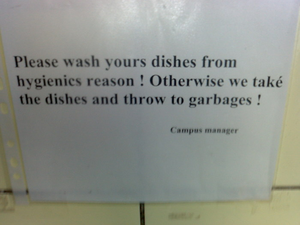
Czenglish
Encyclopedia

Portmanteau word
A portmanteau or portmanteau word is a blend of two words or morphemes into one new word. A portmanteau word typically combines both sounds and meanings, as in smog, coined by blending smoke and fog. More generally, it may refer to any term or phrase that combines two or more meanings...
of the words Czech and English, is a poor or 'broken' English
English language
English is a West Germanic language that arose in the Anglo-Saxon kingdoms of England and spread into what was to become south-east Scotland under the influence of the Anglian medieval kingdom of Northumbria...
spoken by native Czech
Czech language
Czech is a West Slavic language with about 12 million native speakers; it is the majority language in the Czech Republic and spoken by Czechs worldwide. The language was known as Bohemian in English until the late 19th century...
speakers. Examples include confusing verbatim translations (such as "basic school" for "základní škola", which should be "primary school" or "elementary school"), incorrect word order
Word order
In linguistics, word order typology refers to the study of the order of the syntactic constituents of a language, and how different languages can employ different orders. Correlations between orders found in different syntactic subdomains are also of interest...
in a sentence and use of inappropriate prepositions and conjunctions
Grammatical conjunction
In grammar, a conjunction is a part of speech that connects two words, sentences, phrases or clauses together. A discourse connective is a conjunction joining sentences. This definition may overlap with that of other parts of speech, so what constitutes a "conjunction" must be defined for each...
because of the influence of their Czech equivalents.
Another typical aspect is the absence of definite articles (due to the lack of articles in the Czech language) and using of "some" in place of an indefinite article. In Czenglish as well as Central European accents /θ/ is often pronounced as [s], [t] or [f] and /ð/ as [d], and /r/ is sometimes pronounced as an alveolar trill
Alveolar trill
The alveolar trill is a type of consonantal sound, used in some spoken languages. The symbol in the International Phonetic Alphabet that represents dental, alveolar, and postalveolar trills is , and the equivalent X-SAMPA symbol is r. It is commonly called the rolled R, rolling R, or trilled R...
as in some Scottish accents, rather than the more standard approximant. Voiced consonants
Voice (phonetics)
Voice or voicing is a term used in phonetics and phonology to characterize speech sounds, with sounds described as either voiceless or voiced. The term, however, is used to refer to two separate concepts. Voicing can refer to the articulatory process in which the vocal cords vibrate...
at the end of words like "big" are pronounced unvoiced ([bɪk]); final "ng" is pronounced as [nk] or [ŋk].
Similar things also happen in Slovakia. This is due to the similarities of the Czech and Slovak languages.
Language humour
Some elements of Czenglish only cause a little confusion and are eventually understood by a native speaker. Others, however, may lead to much more embarrassing situations, since for a native English speaker they seem to be correct English sentences, although the Czech speaker meant to say something different. Such misunderstanding may be recognized only by considering the appropriateness of each of the possible meanings in the given context.Example
- A Czech girl was working in a pub in the UK when the landlord asked her if she could possibly continue to work longer hours. She replied, "Only if you get down on your knees and please me". The confusion here arises from the Czech word prosím, which is most commonly an idiom which translates as "please", but is literally part of the verb prosit meaning "to beg".
External links
- Common Czenglish mistakes (based on Starling's book)
- Czenglish – an explanation? (A possible explanation for the lack of proof reading in foreign language menus, advertising etc in the Czech Republic)

